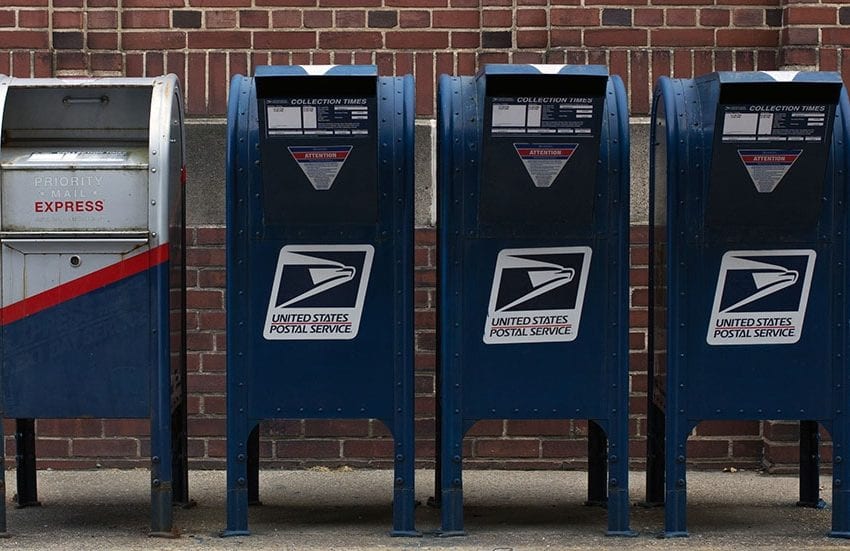
The United States Postal Service (USPS) has published its guidance for mailing vaping products on the Federal Register. The notice provides some clarity on USPS policy and outlined potential exceptions, which could include legal hemp and its derivatives. Until the final rule is issued, ENDS are not subject to the Prevent All Cigarette Trafficking (PACT) Act. The USPS also says that it will not review any exemption applications before the rule is finalized. The agency did, however, state that it has attempted to streamline the application process.
The USPS makes reference to possibly exempting cannabis products. Other exceptions include intrastate shipping within Alaska and Hawaii, shipment between businesses engaged in tobacco product manufacturing, distribution, wholesale, export, import, testing, investigation, or research, shipments by individuals for noncommercial purposes (including return of goods to manufacturer), limited shipments by manufacturers to adult smokers for consumer testing, and limited shipments by federal agencies for public health purposes.

When filing for exemption status for mailings related to possibly exempt situations such as legal hemp and CBD products, business-to-business and research, the USPS guidance suggests that applicants create a spreadsheet that contains the following data elements with respect to each sender and recipient address that they intend to identify in their exemption application:
- Business or governmental entity name.
- Address.
- The Postal Service retail or business mail acceptance office(s) where each intended sender would tender shipments.
- The Postal Service retail office(s) where each intended recipient would retrieve shipments.
- A description of the business or governmental entity (e.g., battery manufacturer, retail store, wholesale distributor, testing laboratory).
- For each permit or license, the issuing jurisdiction; the permit or license number; the expiration date (if any); and the activity covered by each current permit or license (e.g., general business operations; sale or manufacture of tobacco products or ENDS).
- For each sender or addressee engaged in testing, investigation, or research, the entities authorizing the conduct of such activities; the expiration date (if any) of such authorization; and a brief statement of the subject of each authorization (e.g., health effects of flavor substances, medical effects of cannabidiol (“CBD”), battery safety testing).
- The brand name and a description of each product intended to be shipped by each sender or to each addressee.
- Whether any identified products or other intended shipments from each sender or to each addressee contain lithium batteries, nicotine, CBD, or tetrahydrocannabinol (“THC”).
- For products containing nicotine or THC, the intended quantity of the product per shipment and the concentration of nicotine or THC.
- For products containing CBD with a THC concentration not exceeding 0.3 percent, whether the CBD derives from hemp.
“If any of the relevant exceptions are ultimately made available for [electronic nicotine delivery systems (ENDS)], then, given the highly decentralized nature of the ENDS industry relative to the industries historically covered by the PACT Act, the Postal Service anticipates receiving ENDS-related exception applications at a rate several orders of magnitude above the historic norm,” the guidance reads. “The Postal Service has not yet determined whether and to what extent those exceptions will be extended to ENDS. Early acceptance of applications would pose significant administrative challenges for the very Postal Service personnel who are developing the final rule amid substantial public comment under a tight timeframe.

“The Postal Service understands that those concerns are heightened by Congress’s decision to make ENDS nonmailable immediately upon publication of the final rule, rather than applying the 30-day notice period that typically follows a final rule under the Administrative Procedure Act. Therefore, this document is intended to clarify the state of the exception application process in advance of the final rule and to provide guidance to mailers interested in availing themselves of any exceptions that may ultimately be made available.”
Creating spreadsheets listing every address is an arduous task, according to many vaping industry businesses, however it’s just one of the requirements placed on business owners when the federal government placed electronic nicotine-delivery system (ENDS) products under the PACT Act rules. Among other requirements, the PACT Act also stipulates that manufacturers register with the Bureau of Alcohol, Tobacco, Firearm and Explosives (ATF), as well as file monthly reports with state tobacco tax administrators.
Effective March 28th, 2021, recipients of all vaping product(s) purchased online are required, by law, to present ID and sign for their delivery. Many states are expecting businesses to start filing monthly reports on May 10 and the USPS is expecting to post the final rule and officially end the mailing of ENDS products to consumers on April 27. The rules are also having an impact internationally. The U.K. Vaping Industry Association (UKVIA), for example, has expressed “deep concern” about the measures, saying that U.K. business are affected.












